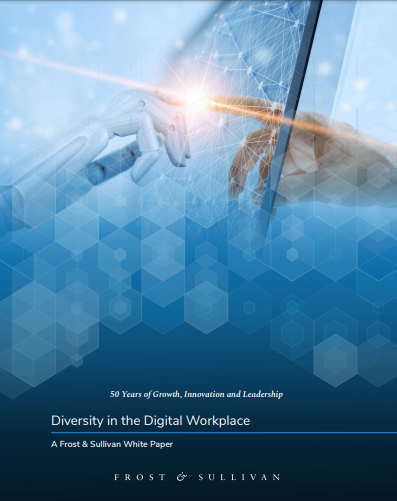Why a diverse workforce builds better products
From avoiding AI SNAFUs to increasing revenue, greater diversity means greater business benefits


It's the very tail end of 2019 and we are still writing articles about the lack of diversity in the tech sector despite clearly understanding the benefits that it can bring. Can you believe it? But the facts speak for themselves. Survey after survey shows that the sector still lacks diversity, not just in the big companies, but across the board.
So, the problem remains, and the time is right as we ring out the old year and ring in a new one, to take another look at what’s going on and why diversity is such a good thing for the tech sector.
Are we there yet?
A major report from Inclusive Boards, which encourages organisations to develop more inclusive and representative boards and senior teams, found that the tech sector’s senior leadership is woefully lacking in diversity.
RELATED RESOURCE

Diversity in the digital workplace
The future of work is a collaborative effort between humans and robots
The report revealed that 65% of boards in the top tech firms had no female directors, while over two-fifths of executive teams had no female representation and just 8.5% of senior leaders in the sector were from a black, Asian, minority ethnic (BAME) background. Additionally, 35% of board members and 26% of senior executives in the top tech firms attended Oxford or Cambridge universities, compared to just 1% of the general population.
The makeup of the workforce is similarly problematic. Research from Tech Nation has found that just 19% of workers in tech are women and 15% are BAME. When it comes to age found that 72% are over 35 years old, giving the lie to the fact that this is a young sector. The BAME figure is 5% higher than the proportion across the UK workforce as a whole, but is still not reflective of the country’s demographic makeup and in general it seems both the tech workforce and its board directors are a long way from being representative.
A cautionary tale
Joy Buolamwini from the MIT Media Lab has researched bias in facial recognition technology, and found that the darker a person’s skin, the less easy it is for the technology to tell the difference between men and women. The much reported work cites facial recognition databases populated by mostly white, male faces as the cause of errors in recognition in wider, more diverse real world situations.
Companies to combat AI bias with forensic experts Tech firms pledge to make the C-suite more diverse UK government issues big funding boost to search for diverse talent AI Industry "overwhelmingly" white and male Diversity pays with tech investment The IT Pro Podcast: How upskilling can improve diversity
Would a more diverse workforce involved in developing the facial recognition AI Joy Buolamwini investigated have spotted the problem before it was let loose on the world? Well, it is certainly a possibility.
Get the ITPro daily newsletter
Sign up today and you will receive a free copy of our Future Focus 2025 report - the leading guidance on AI, cybersecurity and other IT challenges as per 700+ senior executives
Diversity breeds success
Where diversity is in evidence in a workforce, it can really breed success. Deloitte’s Fast 50 programme celebrates success in technology companies. In its 2018 report, Deloitte paid particular attention to diversity, and the report notes that almost 70% of its winning 50 companies see diversity and inclusion as “extremely important or very important to the growth of their company.”
The companies don’t just talk the talk either, but put this into practice. For example, in a survey of the Fast 50 companies around half have a more than 20% BAME, which is 5% higher than the average as reported by Tech Nation. Where women are concerned half the Fast 50 survey respondents have a workforce that’s over 40% identifying as female, up from a third of companies in 2015.
Reap the business benefits
The Deloitte report found three areas where diversity plays a big part in driving a business forwards: enhancing products and services, business development in new markets, and hiring and retaining talent. The Deloitte report is also clear in its correlation between diversity and profitability, saying “The diversity and inclusion among our survey respondents drives diversity of thought and has helped them to achieve outstanding revenue growth.”
RELATED RESOURCE

Diversity in the digital workplace
The future of work is a collaborative effort between humans and robots
Revenue benefits don’t just come to the high fliers like the Deloitte Fast 50, but they can come to all tech companies embracing diversity. Tech Nation’s report identifies a £70,000 turnover premium for directors on boards with gender diversity, for example.
Drilling down into the reasons for this revenue premium, the Chartered Management Institute (CMI) lists five business benefits from a diverse team: increased creativity and innovation, better problem solving and decision making, increased profits, higher employee engagement and better reputation.
So, a diverse workforce can help a company eliminate conscious and unconscious bias in its products, and that means everything from product design right through to marketing and after-sales. It can help companies find the most talented people because talent isn’t the exclusive domain of one group of people. Diverse teams produce better products, they are more creative, more engaged at work, and a company’s reputation is enhanced through its diversity.
What’s not to like? Isn’t it time more firms in the technology sector step up to the plate to embrace diversity and reap the rewards?

Sandra Vogel is a freelance journalist with decades of experience in long-form and explainer content, research papers, case studies, white papers, blogs, books, and hardware reviews. She has contributed to ZDNet, national newspapers and many of the best known technology web sites.
At ITPro, Sandra has contributed articles on artificial intelligence (AI), measures that can be taken to cope with inflation, the telecoms industry, risk management, and C-suite strategies. In the past, Sandra also contributed handset reviews for ITPro and has written for the brand for more than 13 years in total.
-
 Bigger salaries, more burnout: Is the CISO role in crisis?
Bigger salaries, more burnout: Is the CISO role in crisis?In-depth CISOs are more stressed than ever before – but why is this and what can be done?
By Kate O'Flaherty Published
-
 Cheap cyber crime kits can be bought on the dark web for less than $25
Cheap cyber crime kits can be bought on the dark web for less than $25News Research from NordVPN shows phishing kits are now widely available on the dark web and via messaging apps like Telegram, and are often selling for less than $25.
By Emma Woollacott Published
-
 Imposter syndrome is pushing women out of tech
Imposter syndrome is pushing women out of techNews Men have dominated the tech space, though some evidence suggests that it's beginning to change
By George Fitzmaurice Published
-
 DEI rollbacks could exacerbate tech talent shortages – nearly half of recruitment leaders worry diversity cuts will impact their company’s appeal and employee retention
DEI rollbacks could exacerbate tech talent shortages – nearly half of recruitment leaders worry diversity cuts will impact their company’s appeal and employee retentionNews Finding talent with AI skills has already become a major challenge for enterprises, but with some enterprises shelving DEI hiring practices, research suggests the situation could get worse.
By Emma Woollacott Published
-
 Women in tech think the industry has changed for the better, but there’s still more work to be done
Women in tech think the industry has changed for the better, but there’s still more work to be doneNews 84% of female tech leaders in the US believe the industry has changed for the better, but lingering issues still persist.
By Nicole Kobie Published
-
 Businesses know they have major skills deficits, but less than half plan on hiring more women
Businesses know they have major skills deficits, but less than half plan on hiring more womenNews Male IT leaders remain complacent about gender diversity despite widespread skills shortages
By Emma Woollacott Published
-
 Addressing the gender divide in the channel
Addressing the gender divide in the channelIndustry Insight Tackling a long-standing gender deficit could be a key differentiator for the channel amid challenging economic conditions
By Celine Cazali Published
-
 Female representation in UK cyber drops amid growing skills demand
Female representation in UK cyber drops amid growing skills demandNews While firms are accelerating efforts to recruit more women, an industry shortfall still remains
By Ross Kelly Published
-
 Little is being done to address the tech industry's racial hiring bias, report
Little is being done to address the tech industry's racial hiring bias, reportNews Non-white individuals are far less likely to be offered an interview compared to other applicant groups, research shows
By Ross Kelly Published
-
 Proudflare: Inside Cloudflare's pioneering DEI efforts
Proudflare: Inside Cloudflare's pioneering DEI effortsNews Cloudflare's initiative provides free services for at-risk advocacy groups
By Rory Bathgate Published